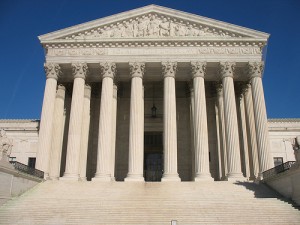Posted
18 Oct 2013 in Case Notes
The
first significant case affecting local governments in this new Supreme Court term --
Madigan v. Levin -- ended poorly. The Court resolved the case
with a DIG -- the Court dismissed it as improvidently granted.

What went wrong? And what can we learn from it about appellate jurisdiction?
An Important Question
The case had all the hallmarks of a classic Supreme Court case.
The question presented was important. It asked whether when a state or local government employee alleges that his employer has discriminated against him because of his age, the Age Discrimination in Employment Act ("ADEA") provides his exclusive remedy, or whether he may also bring a claim under 42 U.S.C. 1983 because the discrimination violates the Constitution's Equal-Protection Clause.
The question had divided the lower courts. The Seventh Circuit acknowledged that its holding -- that the ADEA does not prevent the employee from bringing a Section 1983 claim -- created a deep circuit split.
And it had far-reaching implications. It could literally impact every state and local government.
What Went Wrong?
So why would the Court, after granting cert. and hearing oral argument, suddenly change its mind and toss the case?
 In Hagen v. City of Eugene, No. 12-35492 (Dec. 3, 2013), the Ninth Circuit ruled that a public employee did not have a viable First Amendment claim under the particular circumstances there. The court ruled that, viewing all the evidence in the light most favorable to the employee, he was speaking as a public employee, not a private citizen.
The case involved a City police officer, Brian Hagen, who noticed that members of his SWAT team were often firing their weapons accidentally and negigently. Hagen tried to make his concerns about the team "as public as possible" by sending e-mails and raising the issue in meetings. Eventually, Hagen was removed from the K-9 team.
Hagen claimed that the City and senior officers had retaliated against him for exercising his First Amendment rights.
In Hagen v. City of Eugene, No. 12-35492 (Dec. 3, 2013), the Ninth Circuit ruled that a public employee did not have a viable First Amendment claim under the particular circumstances there. The court ruled that, viewing all the evidence in the light most favorable to the employee, he was speaking as a public employee, not a private citizen.
The case involved a City police officer, Brian Hagen, who noticed that members of his SWAT team were often firing their weapons accidentally and negigently. Hagen tried to make his concerns about the team "as public as possible" by sending e-mails and raising the issue in meetings. Eventually, Hagen was removed from the K-9 team.
Hagen claimed that the City and senior officers had retaliated against him for exercising his First Amendment rights.







